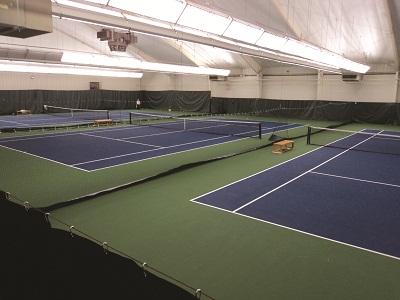
 |
| Photo courtesy of Carolina Green Corp., Indian Trail, NC |
So, you’ve decided to take the plunge and organize your own event after years of paying to participate in someone else’s event. Maybe you’re just wondering if you are getting the best value out of your facility rentals. Whether you're trying to organize a softball tournament, an equestrian event, a senior tennis tournament or a youth soccer showcase, here’s how it really works, from both sides of the negotiating table.
I’ve participated in dozens of these kinds of deals as either the facility manager or the event organizer. Here's the secret: the organizers who understand how the facility owners think are generally the most successful. Not just successful in terms of paying the least in rental fees or licenses, but also in getting better support from facility staff, getting the dates they want, and establishing real partnerships with the facility operators that ensure their event’s long-term viability.
Understand the Facility Owner’s Priorities
How big an emphasis does the facility owner place on economic development?
If a facility was conceived and built solely for the use of the organization that owns it, you may have a tough time getting into that facility. College facilities are often the toughest to rent, since they are virtually always built expressly for the college or university’s own use. There is also normally a head coach who has a big say over how the facility is run and used. If there is even the slightest possibility that your event could negatively impact the college’s success, you will have a very tough time. It’s not personal, though. Think it through from the head coach’s perspective; if the program is not successful in wins or delivering the best-possible experience for their own student-athletes, that coach will be looking for a new job. With this in mind, it’s pretty easy to see why many college coaches are so protective of their turf, figuratively and literally.
If, on the other hand, you are looking to rent a municipal facility, you may find the local government very receptive, if the facility was built for both local citizen use and outside events. Even facilities that were built solely for local use can often be accessed for outside events. Just understand the priorities of the people on the other side of the table. They want to preserve their facility’s ability to serve the local citizens. If your event tears up the turf in the city’s big soccer park, the recreation department people will hear complaints from their program’s participants, and ultimately from city leadership. Would you take that chance if you were in their shoes?
Remember that in both college and municipal facilities, the people you are talking to will likely not get a single cent more in their paychecks as a result of your event. They will have another item on their already-jammed 'to-do' list, and a good possibility of working the event themselves, or dealing with weekend or after-hours phone calls if there are problems during your event. Again, ask yourself if you would be eager to host your event if your were on the other side of the table.
 |
| Photo courtesy of Verde Design, Inc., Santa Clara, CA |
Professional Pride, Political Pressure and Economic Development
Of course, it’s not all doom and gloom. Thousands and thousands of events are held every year all over the world with outside event organizers using other people’s facilities, and many of them are successful and operate year after year. So, what cards do you have to play?
Your natural ally is the local sports tourism agency, especially if you are bringing in an event that will attract out-of-town participants and spectators. Most communities have an organization that recruits sports events in the interest of tourism. This may be under the umbrella of the Convention & Visitors Bureau (CVB), the Chamber of Commerce, or a separate organization called a Sports Commission, Sports Development Committee or the like.
 |
| Photo courtesy of Beynon Sports Surfaces, Hunt Valley, MD |
These organizations exist to generate hotel-room and restaurant-meal revenue to positively impact the local economy in their communities. They have a strong incentive to bring your event to town or help grow an existing event, and they generally have good working relationships with the people in the community who own and operate the facilities that you want. Start with them -- unless you have an existing relationship with the people operating the facility you hope to rent. You need to be upfront and honest about what your event brings to town. You might get some help one time with inflated economic impact numbers, but not twice, if you don’t deliver.
You may also be able to get some financial assistance from the local sports tourism organization. They may have some money available to assist with event promotion and advertising, bid fees or facility rental costs. It never hurts to ask.
Another element in your favor is the responsibility and professional pride of the people who operate these facilities. Many municipal facilities are run by staff who are charged, as part of their job, with bringing in some outside events. Remember, though, they don’t necessarily have to bring in Your event, but they will generally be expected to bring in Some events. A positive reference from another municipality or an individual with ties in that community may be helpful, and having a track record of successful events is also an advantage. So, be easy to work with, be professional, understand the facility owner’s concerns, and you may very well be able to get the facility you want.
 |
| Photo courtesy of Baseline Sports Construction LLC, Knoxville, TN |
Nuts and Bolts
There are also some important logistical considerations in nearly every facility rental situation. First, do you have adequate liability insurance? Most facility owners will now require at least $2 million in liability coverage, and this must be documented with a certificate of insurance that specifies the date, location and includes the facility owner as an “additional insured,” meaning that the facility owner will be covered by your insurance policy. This is typically one of the major benefits of having your event sanctioned by a national or regional organization; in exchange for your sanctioning fee, you have liability coverage that you couldn’t afford on your own, as well as a 'brand name' that adds credibility to your event.
Second, do you have the funds to pay for the facility in advance? Regular users often can have billing after the event, but a first-time renter may need to pay at least a portion of the rental fee in advance. Make sure you understand what other costs may be involved. Do you also have to pay for one of the facility’s staff people to be there? Do you have a clean-up fee on top of rental? Does the facility keep concessions revenues or charge for parking or admission?
Thirdly, have you addressed weather issues? The facility owner, particularly where natural grass fields are involved, will typically reserve the right to cancel your event if the weather creates a chance the field could be torn up. Be prepared; while your regional tournament may be the most important event on your calendar, it’s just another event for the facility owner, and they will NOT risk damage to their fields for any but the most important events.
Finally, are you allowing adequate lead-time? In my years managing recreation facilities, I would get dozens of calls every year from people wanting to rent one of our very popular facilities on very short notice. They didn’t have a chance unless they had submitted a request months, or even up to a year in advance.
Relationships, relationships, relationships…
If you want your event to be a long-term success that brings you money, joy, and critical acclaim, you need to establish relationships with the key people in this process. This includes the sports tourism folks, the facility decision-makers, the facility managers and even the weekend facility staff. Buy them lunch. Tell them how much you appreciate what they do for you. Understand where they are coming from and their priorities, treat them with respect, and you will be on your way to long and happy run as an event organizer.

